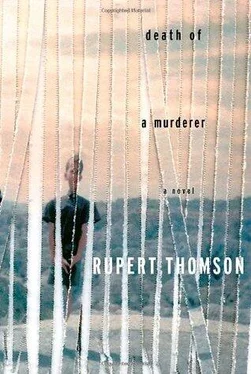Trevor’s room was on the ground floor, behind reception. On opening the door, Billy saw that the room had been designed for people who were disabled, with pinkish-brown grab-rails everywhere, and a red string dangling between the toilet and the bath. IN THE EVENT OF AN EMERGENCY THE DUTY MANAGER CAN BE CALLED BY PULLING THE RED CORD. Billy hoped it wouldn’t come to that.
“Asked for a non-smoking room,” Trevor said, slurring his words, “and this’s all they had.” His head lurched on his neck as he looked around. “It’s no different, really. Everything’s a bit lower, that’s all. The bed, door-handles…”
“It’s fine,” Billy said.
Trevor stumbled into the bathroom. Through the closed door, Billy heard the splash of urine, then a controlled roar as the toilet flushed.
When Trevor emerged again, he avoided Billy’s gaze. “Sorry about all that,” he said, wiping his face. “Sorry, Billy. God. Do you want a drink?”
He seemed to have pulled himself together. His speech was clearer. All the same, Billy didn’t feel he could leave Trevor on his own.
“Go on, then,” he said. “Just the one.”
Trevor fetched two water-glasses from the bathroom, then opened his briefcase and took out some red wine and a corkscrew. “I always have a bottle on me,” he said, “just in case I run into an old friend.” He was trying to be funny, but his voice was too thin to carry it off. Too wobbly.
He poured the wine. Even as he held out a glass for Billy, he was gulping from his own. “So I never told you what happened to me?” he said.
Billy crossed the room and sat down in the armchair by the window. He had checked into the Travel Inn because he was tired, and here he was, staying up and getting drunk. “When are you talking about?” he said.
“When I was ten.”
“I didn’t know you then. You’d moved away.”
“That’s right.” Trevor settled on the end of the bed. He drank some more wine, then reached out and placed his glass on the desk where the TV was. Only alcoholics put glasses down that carefully.
“So what happened?” Billy said.
Trevor began to talk about the old days again, what he called “back then”—children off playing by themselves, and no one giving them a thought. Had it ever really been like that? Maybe it had. What Billy remembered most, though, was the housing boom, and all that building going on. Stacks of bricks, cement-mixers. Scaffolding. He and Trevor would climb up inside the new houses and drop messages down between the walls: swearwords, or spells, or sometimes just their two names and the date. They were still there, probably…Only dimly aware of Trevor’s voice, Billy was on the point of drifting off to sleep when a single sentence drew him right in close.
“But that day, for some reason, I was all alone…”
Billy roused himself. “Sorry. Where was this?”
“In Manchester. A place called Fallowfield.”
A white car pulled alongside him, Trevor said, as he was walking. The driver was a woman, and she was on her own. She wound her window down, called out to him. He couldn’t remember what she said, but he remembered that she had a hard voice, flinty and impatient; she sounded like someone who was bad-tempered, or in a hurry. She had black hair, with a headscarf tied over it. Though it was November, she dangled her right arm out of the window, and her painted nails showed up vividly against the door. Between the first and second fingers was a cigarette. There was a moment when she withdrew her arm and dragged on the cigarette, and the whole time she was inhaling she never took her eyes off him, then her arm returned to where it had been before, and the smoke soon followed in a thin blue stream.
His parents had told him that there were people called “strangers,” and that they might offer him a bag of sweets, or a ride in their car, and that he should always say “No, thank you,” but somehow, that afternoon, he forgot everything he’d been taught. Oddly enough, it was the woman’s harshness that drew him across the pavement. She didn’t make the slightest attempt to be friendly, let alone seductive. On the contrary. If he couldn’t be of any use to her, she would have to find somebody else, and he could see that thought annoyed her.
“I wondered later,” Trevor said, his eyes wide now, “whether she might have been nervous, you know?” He paused. “I mean, what if I was one of the first?”
At this point, Billy still wasn’t quite sure what Trevor was talking about, but he decided not to interrupt.
Trevor went on. When he stopped at the kerb, the woman told him that she was lost. Did he know the area? He nodded. Good, she said. If he would just get into the car, maybe he could show her the way. Once again, there was no subtlety in her approach, nothing remotely clever or ingratiating. He asked her where she was going. He called her “Miss.” Instead of answering, she cocked her head, appraising him, and then said something about him looking bright as a button: if he couldn’t help her, she said, nobody could. Only then did he feel a flicker of misgiving. It was because she had flattered him. The hardness, the impatience — they were believable; they seemed real, and he trusted them. But the flattery felt different, like something shiny that wasn’t actually worth anything. So why did he get into the car? He didn’t have an explanation. It still puzzled him, even today. Round the front he went, her made-up eyes tracking him across the windscreen. When he reached the passenger’s side, the door was already open. All he had to do was climb in and pull it shut.
“Give it a good slam,” the woman told him. “We don’t want you falling out now, do we?”
Trevor looked away into the room. “Fuck,” he murmured, then reached for his drink and finished it. He poured himself another glass, right up to the brim, and held the bottle out to Billy, but Billy shook his head. He’d had enough.
“It was so quiet,” Trevor said. “I don’t remember any noise at all.” He paused again. “No, wait, that’s wrong. Once, on a bend, I heard a motorbike. That was him, of course. He was following.”
Only now did Billy understand what Trevor had been telling him, and he leaned forwards in his chair, clear-headed suddenly, as though all the alcohol had drained out of his body. “So you saw him too?” he said.
Trevor closed his eyes. “We haven’t got to that bit yet.”
They drove on for a while, and the woman kept her eyes fixed on the road. She braked, she indicated; everything was so normal that he forgot what he was doing there. Then he came to. She hadn’t asked him for directions; she hadn’t spoken to him at all, in fact. He glanced at her, and it wasn’t her nails or her hair that he saw, but her blunt nose and her jutting chin. Any glamour there might have been had gone, and he was beginning to suspect that something might be wrong.
“I thought you were lost,” he murmured.
The woman didn’t seem to hear him.
Some time later, he said, “You haven’t asked me which way to go.”
“We’re going to my gran’s house first,” she told him. “I forgot my gloves.”
She parked in an area he didn’t recognise. It looked poorer than where he lived. Rubbish was blowing about: bubble-gum wrappers, pages from the paper, plastic bags. On the roof of a nearby house a TV aerial quivered. It was windy out that day. He brought his eyes back down. A brown bottle rolled across the pavement, then stopped and rolled the other way. He remembered the sound of that bottle with such clarity that it might have happened half an hour ago. But it was thirty years now, thirty years…
“Come inside for a second,” the woman said. “Come and help me find those gloves.”
Читать дальше












